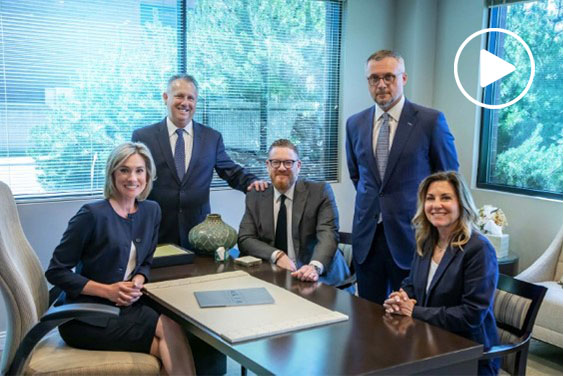Wheaton |
St. Charles |
Sycamore
 630-665-7300
630-665-7300
Naperville, Illinois Collaborative Divorce Lawyers

Henry's counsel was superb and still sensitive to both parties.
Henry provided guidance through the entire process."
Why Clients Trust Us
- Our firm has a 75-year history of excellence
- Our attorneys have over 200 years of combined legal experience
- We have been recognized by Super Lawyers, Elite Lawyer, Best Lawyers, and Avvo
- We have received 200+ 5-star reviews from clients
Attorneys Helping Clients Use Collaborative Law in Naperville Divorce Cases
Attorney Spotlight

Henry D. Kass
- Collaborative Divorce Illinois (CDI), Fellow, 2019-Present
- Elite Lawyer, 2020-Present
- International Academy of Collaborative Professionals, 2019-Present
- Qualified Parenting Coordinator (Domestic Relations), 2024
- Super Lawyers, 2015-Present
- Top Attorneys in Illinois, Chicago Magazine, 2015, 2017
Contact Us Today
Billing and Fee Structures
We work to ensure that our fees are reasonable and affordable for all of our clients. To discuss our fee structures and learn about payment options, contact us at 630-665-7300.
When married spouses, unmarried parents, or other family members are involved in family law cases, they may encounter disputes that can be difficult to resolve. Litigating these matters in family court can be stressful, and it may lead to increased conflict, making it more difficult to find solutions. For many families, collaborative law can provide a beneficial alternative to litigation that will encourage respectful communication and cooperative problem-solving.
At Mirabella, Kincaid, Frederick & Mirabella, LLC, we help clients use collaborative law to reach practical, long-term solutions in divorce cases and other family law matters. Our attorneys work closely with our clients to identify their goals and make sure they understand their legal rights, and we help to negotiate fair and balanced agreements. By prioritizing cooperation and transparency, we help clients find solutions that will preserve relationships, protect their children, and give them greater control over the outcomes of their cases.
What Is Collaborative Law?
Collaborative law is a non-adversarial approach to resolving family law disputes. In a collaborative divorce or family law case, each party will be represented by an attorney who is trained in collaborative law. The parties and their attorneys will agree in writing to resolve their outstanding legal issues outside of court. The process focuses on open communication, mutual respect, and finding solutions that benefit the entire family.
The central element of collaborative law is the participation agreement. This document sets the tone for the process by establishing the following:
- Both parties agree to resolve disputes without litigation.
- The attorneys involved will withdraw if the case proceeds to court.
- All parties commit to full transparency and an honest exchange of information.
- Communication will be respectful and focused on problem-solving.
This agreement promotes a cooperative mindset and helps ensure that all participants are working toward shared goals.
Effective Representation in Collaborative Divorce and Family Law Cases
At Mirabella, Kincaid, Frederick & Mirabella, LLC, our attorneys are trained in collaborative law, and we understand the unique strategies that may be used to help our clients achieve agreements that reflect their needs and priorities. We assist with a wide range of family law matters through the collaborative process, including:
- Divorce
- Legal separation
- Division of marital property
- Child custody and parenting plans
- Child support
- Spousal maintenance
- Post-decree modifications
We begin by helping clients assess whether the collaborative process is appropriate for their situation. If so, we help prepare for joint sessions, explain the legal issues that may affect negotiations, and work with other professionals as needed to ensure that discussions are productive while working to find effective, sustainable solutions.
The Collaborative Law Process
Collaborative divorce and family law cases will typically follow a structured, step-by-step process designed to promote open dialogue and shared decision-making. The steps involved in the collaboriative process may include:
- Signing the Participation Agreement: All parties will agree in writing to resolve disputes without going to court.
- Initial Meetings: The parties and their attorneys may meet to identify goals, clarify concerns, and develop a roadmap for negotiations.
- Exchange of Information: Financial documents and other relevant materials will be shared voluntarily and transparently.
- Problem-Solving Sessions: The parties and their attorneys may meet regularly to discuss specific issues and explore options. Our attorneys will work to ensure that the legal rights of our clients are protected while maintaining a cooperative tone.
- Use of Other Professionals: As needed, neutral professionals may be brought in to assist with specific aspects of the case.
- Drafting the Agreement: Once terms are agreed upon, our attorneys will prepare a written settlement that will be submitted to the court for approval. We will ensure that our clients fully understand the terms of their agreements and the legal requirements that will apply to them after court orders are issued.
Professionals Involved in Collaborative Family Law Cases
Collaborative law often involves a team approach, with neutral professionals helping to guide the process and provide insight into complex issues. These professionals may include:
- Financial Experts: Accountants or other professionals may assist with asset valuations, budgeting, tax planning, and property division.
- Child Specialists: Family therapists, child psychologists, or other mental health professionals may help address parenting issues, provide parents with an understanding of the needs of their children, and assist in developing parenting plans.
- Divorce Coaches: Licensed professionals may work with the parties to facilitate communication, manage emotional stress, and help maintain a focus on positive solutions.
Benefits of Collaborative Law in Family Cases
Collaborative law offers several advantages over traditional litigation, especially in emotionally sensitive family law matters. These include:
- The ability to hold a more respectful and constructive dialogue when discussing disputed issues
- Greater privacy and confidentiality
- Reduced legal costs in many cases
- The ability to resolve cases more quickly
- A focus on the long-term well-being of the parties, their children, or other family members rather than short-term victories
- Customizable solutions that can be tailored to meet a family's unique needs
- Improved communication, which can help the parties establish positive co-parenting relationships
Collaborative law can help families transition into new circumstances while minimizing disruptions and helping to avoid conflict. This can create a foundation for healthier relationships moving forward.

Family Law Cases in DuPage County
Our attorneys work with clients in Naperville, helping to resolve disputes in cases heard at the DuPage County Courthouse, which is located at:
- 505 N County Farm Rd., Wheaton, IL 60187.
Our DuPage County office is located at:
- 1737 South Naperville Road, Suite 100, Wheaton, IL 60189
What Our Clients Say About Our Family Law Services
- "Henry is friendly, knowledgeable, and has great attention to detail. He took the time to get to know my background and explain the process to me before we got into it...I would not hesitate to recommend him to anyone who is looking for a divorce lawyer, particularly one who is skilled and trained in collaborative divorce law."
- "I had a great experience working with Henry Kass. He was super communicative, always on top of everything, and made me feel like my best interests were his top priority. It really made a stressful process so much easier. Highly recommend!"
- "I cannot recommend Henry and his team at Mirabella, Kincaid, Frederick and Mirabella enough...From the start, Henry went above and beyond in handling my case. He truly listened to my concerns, fought for what was right, and consistently provided sound advice to navigate difficult situations."
The Importance of Working With a Trained Collaborative Attorney
Not all attorneys are equipped to handle collaborative cases. It is important to work with a lawyer who is trained in collaborative law and who understands how to support a cooperative process while ensuring that their client's rights will be protected.
At Mirabella, Kincaid, Frederick & Mirabella, LLC, our attorneys have completed training in collaborative family law. We bring a thoughtful, solution-focused approach to each case. We help our clients navigate emotionally charged discussions while advocating for fair outcomes. Our role is to support our client's goals, protect their legal rights, and help to resolve issues as peacefully as possible
When Collaborative Law Negotiations Break Down
While the collaborative process is designed to resolve disputes amicably, it is not always successful. Negotiations may break down if:
- One or both parties are unwilling to compromise
- A party refuses to disclose important financial or personal information
- Emotional conflict makes cooperative discussions impossible
- New issues arise that cannot be resolved through discussions
If the collaborative process fails, both attorneys are required to withdraw from the case, and the parties must hire new counsel as they proceed with litigation. However, many cases that face obstacles can be resolved within the collaborative framework by bringing in additional support or adjusting the strategies to address new concerns.
Community Involvement
Our team works to give back to our community whenever possible. Our community involvement includes:
- Sponsoring and participating in food drives, clothing donation drives, and many other charitable events through Lawyers Lending a Hand and other charities and organizations.
- Providing financial assistance to our clients' family members through our Giving Back for College Reimbursement Program.
- Providing financial aid to students with divorced parents through our Resilient Student Scholarship.
Frequently Asked Questions About Collaborative Law
In a collaborative divorce or family law case, each party will be represented by their own attorney, and the parties and their attorneys will work to resolve disputes without going to court. Mediation involves a neutral third party who will help the parties discuss their outstanding issues and guide them toward agreements. The parties may or may not have their attorneys present during mediation sessions.
Agreements reached through collaborative law are not binding until they are finalized in writing and approved by a judge. Once entered into court, they become enforceable legal orders.
If both parties are committed to working together respectfully, collaborative law may help reduce conflict, and a couple may be able to resolve their outstanding issues and complete their divorce. However, if one or both parties are hostile, uncooperative, or manipulative, the collaborative process may fail. In these situations, traditional litigation may be a more appropriate path.
In many cases, a collaborative divorce will take less time to resolve than a litigated divorce. Many of the delays associated with court scheduling and formal hearings can be avoided, and the parties can conduct negotiation sessions at their own pace. Once an agreed settlement has been reached, the divorce can be finalized by attending a court hearing.
Contact Our Naperville, IL Collaborative Divorce Attorneys
For a respectful and efficient way to resolve family law matters, collaborative law may be the right path forward. The attorneys at Mirabella, Kincaid, Frederick & Mirabella, LLC can help you explore cooperative solutions, and we will work to protect your interests while helping you find solutions that will provide for the well-being of your family. Contact our Naperville collaborative law attorneys at 630-665-7300 to schedule a consultation and learn more about whether a collaborative divorce may be the best choice for you.












 Read More
Read More





